自考英语二unit 1
- 格式:ppt
- 大小:1.55 MB
- 文档页数:19

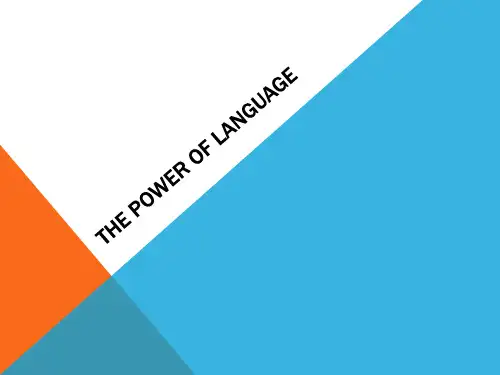
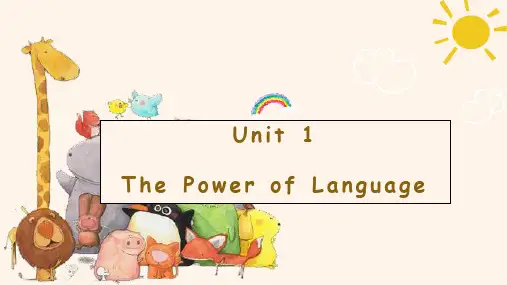
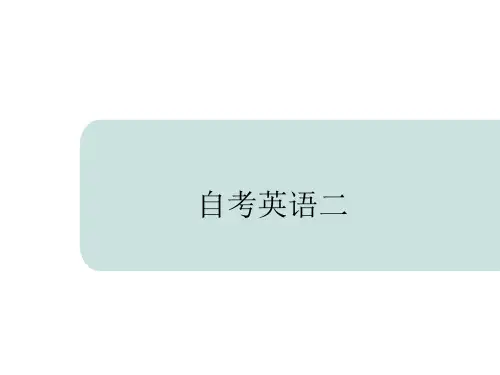
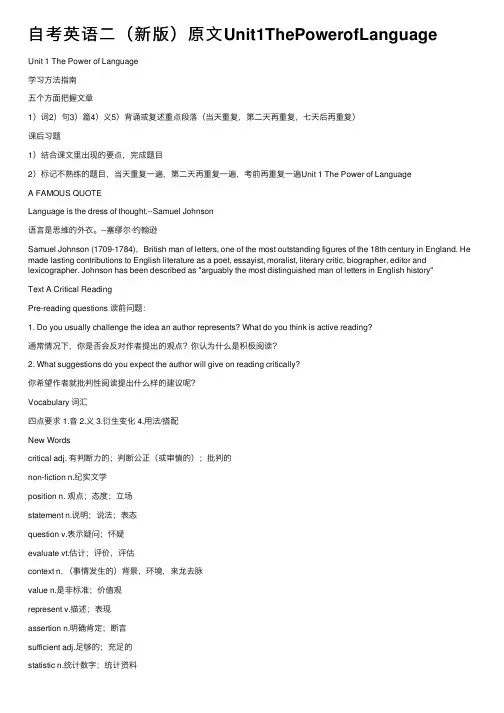
⾃考英语⼆(新版)原⽂Unit1ThePowerofLanguageUnit 1 The Power of Language学习⽅法指南五个⽅⾯把握⽂章1)词2)句3)篇4)义5)背诵或复述重点段落(当天重复,第⼆天再重复,七天后再重复)课后习题1)结合课⽂⾥出现的要点,完成题⽬2)标记不熟练的题⽬,当天重复⼀遍,第⼆天再重复⼀遍,考前再重复⼀遍Unit 1 The Power of LanguageA FAMOUS QUOTELanguage is the dress of thought.--Samuel Johnson语⾔是思维的外⾐。
--塞缪尔·约翰逊Samuel Johnson (1709-1784),British man of letters, one of the most outstanding figures of the 18th century in England. He made lasting contributions to English literature as a poet, essayist, moralist, literary critic, biographer, editor and lexicographer. Johnson has been described as "arguably the most distinguished man of letters in English history"Text A Critical ReadingPre-reading questions 读前问题:1. Do you usually challenge the idea an author represents? What do you think is active reading?通常情况下,你是否会反对作者提出的观点?你认为什么是积极阅读?2. What suggestions do you expect the author will give on reading critically?你希望作者就批判性阅读提出什么样的建议呢?Vocabulary 词汇四点要求 1.⾳ 2.义 3.衍⽣变化 4.⽤法/搭配New Wordscritical adj. 有判断⼒的;判断公正(或审慎的);批判的non-fiction n.纪实⽂学position n. 观点;态度;⽴场statement n.说明;说法;表态question v.表⽰疑问;怀疑evaluate vt.估计;评价,评估context n. (事情发⽣的)背景,环境,来龙去脉value n.是⾮标准;价值观represent v.描述;表现assertion n.明确肯定;断⾔sufficient adj.⾜够的;充⾜的statistic n.统计数字;统计资料integrate v.(使)合并,成为⼀体authority n. 专家;学术权威;泰⽃compare v.⽐较;对⽐subject n.主题;题⽬;题材consistent adj. 相符的;符合的(consistency)inconsistency n.不⼀致assumption n.假定;假设case n. 具体情况;事例directly adv. 直接地;径直地identify v. 找到;发现valid adj. 符合逻辑的;合理的;确凿的credible adj. 可信的;可靠的landmark n.(标志重要阶段的)⾥程碑;地标relevant adj.紧密相关的;切题的current adj. 现时发⽣的;当前的appropriate adj.合适的;恰当的bias n.偏见;偏⼼;偏向considerably adv. ⾮常;很;相当多地Democrat n.(美国)民主党党员,民主党⽀持者Republican n.(美国)共和党党员,共和党⽀持者reflect v.显⽰;表明;表达informed adj.有学问的;有见识的Phrases and Expressionsapply to使⽤;适⽤于put forth 提出;产⽣take sth into account 考虑;顾及accept/take sth at face value 相信表⾯;信以为真with a grain of salt 有保留地;持怀疑态度地重点词汇critical adj. 有判断⼒的;判断公正(或审慎的)eg: Try to develop a more critical attitude, instead of accepting everything at face value. 要学会对⼀切事物⼀丝不苟, ⽽不要注重表⾯现象.其他⽤法:危机中的;危急时刻的;决定性的;关键的eg: We are at a critical time in our history.我们正处于历史的紧要关头。
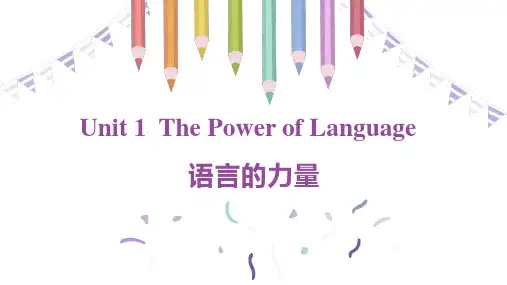
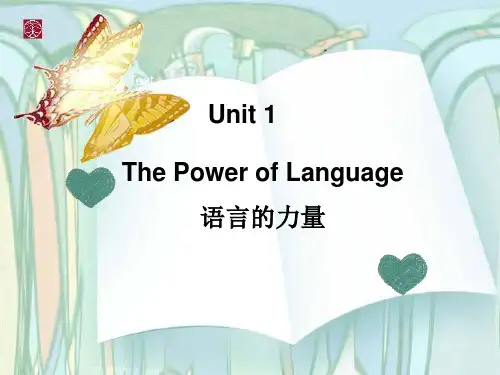
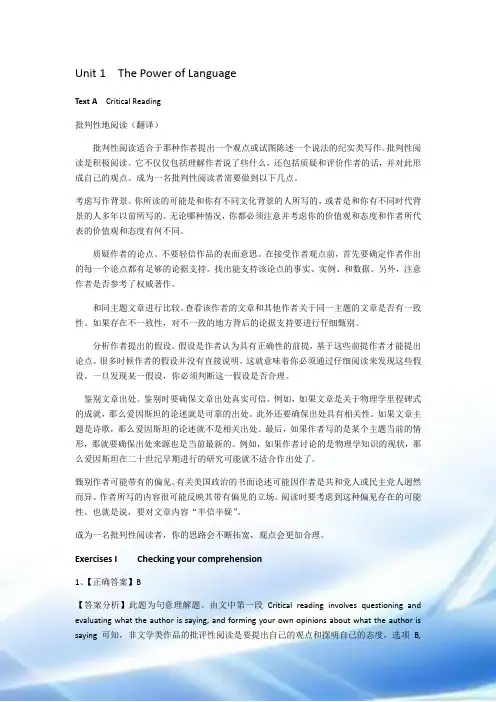
Unit 1 The Power of LanguageText A Critical Reading批判性地阅读(翻译)批判性阅读适合于那种作者提出一个观点或试图陈述一个说法的纪实类写作。
批判性阅读是积极阅读。
它不仅仅包括理解作者说了些什么,还包括质疑和评价作者的话,并对此形成自己的观点。
成为一名批判性阅读者需要做到以下几点。
考虑写作背景。
你所读的可能是和你有不同文化背景的人所写的,或者是和你有不同时代背景的人多年以前所写的。
无论哪种情况,你都必须注意并考虑你的价值观和态度和作者所代表的价值观和态度有何不同。
质疑作者的论点。
不要轻信作品的表面意思。
在接受作者观点前,首先要确定作者作出的每一个论点都有足够的论据支持。
找出能支持该论点的事实、实例、和数据。
另外,注意作者是否参考了权威著作。
和同主题文章进行比较。
查看该作者的文章和其他作者关于同一主题的文章是否有一致性。
如果存在不一致性,对不一致的地方背后的论据支持要进行仔细甄别。
分析作者提出的假设。
假设是作者认为具有正确性的前提,基于这些前提作者才能提出论点。
很多时候作者的假设并没有直接说明,这就意味着你必须通过仔细阅读来发现这些假设。
一旦发现某一假设,你必须判断这一假设是否合理。
鉴别文章出处。
鉴别时要确保文章出处真实可信。
例如,如果文章是关于物理学里程碑式的成就,那么爱因斯坦的论述就是可靠的出处。
此外还要确保出处具有相关性。
如果文章主题是诗歌,那么爱因斯坦的论述就不是相关出处。
最后,如果作者写的是某个主题当前的情形,那就要确保出处来源也是当前最新的。
例如,如果作者讨论的是物理学知识的现状,那么爱因斯坦在二十世纪早期进行的研究可能就不适合作出处了。
甄别作者可能带有的偏见。
有关美国政治的书面论述可能因作者是共和党人或民主党人迥然而异。
作者所写的内容很可能反映其带有偏见的立场。
阅读时要考虑到这种偏见存在的可能性。
也就是说,要对文章内容“半信半疑”。
成为一名批判性阅读者,你的思路会不断拓宽,观点会更加合理。
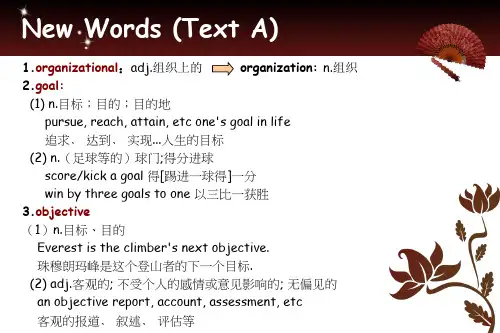
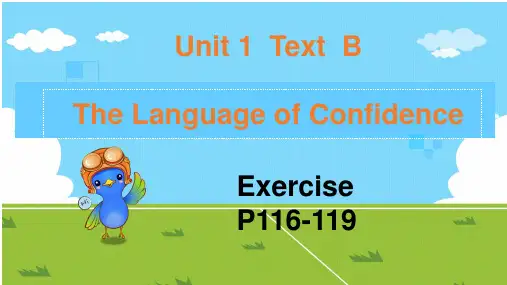
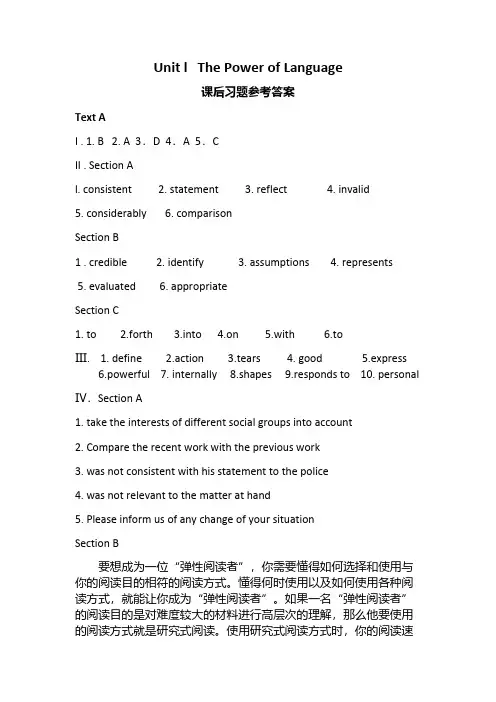
Unit l The Power of Language课后习题参考答案Text AI.1.B 2.A3.D4.A5.CII.Section Al.consistent 2.statement 3.reflect 4.invalid5.considerablyparisonSection B1.credible2.identify3.assumptions4.represents5.evaluated6.appropriateSection C1.to2.forth3.into4.on5.with6.toⅢ. 1.define 2.action 3.tears 4.good 5.express6.powerful7.internally8.shapes9.responds to10.personal Ⅳ.Section A1.take the interests of different social groups into accountpare the recent work with the previous work3.was not consistent with his statement to the police4.was not relevant to the matter at hand5.Please inform us of any change of your situationSection B要想成为一位“弹性阅读者”,你需要懂得如何选择和使用与你的阅读目的相符的阅读方式。
懂得何时使用以及如何使用各种阅读方式,就能让你成为“弹性阅读者”。
如果一名“弹性阅读者”的阅读目的是对难度较大的材料进行高层次的理解,那么他要使用的阅读方式就是研究式阅读。
使用研究式阅读方式时,你的阅读速度应当比正常速度慢。
并且在阅读当中,你必须激发自己的潜力去理解该材料。
研究式阅读常常需要你阅读材料不止一遍,以获得高层次的理解。
教案授课主要内容说明:教师备课笔记由学校自订式样并附后Unit 1 The Power of Language重点词语Text A1.critical 有判断力的,判断公正(或审慎)的A critical reader will notice many errors in this article.有判断力的读者将会注意到这篇文章里有很多错误。
He made a sound critical estimate of the problem.他对该问题作出了审慎可靠的估计。
2.statement n.说明;说法表态1 could not deny the truth of this statement.我不能否认这种说法的真实性。
Soon afterwards she made her first public statement about the affair. 此事的第一次公开表态。
3.evaluate v.估计;评价;评估The professor was asked to evaluate the current situation.人们请这位教授评估一下当前的形势。
The research project has only been under way for three months, so it, s too early to evaluate its success.这个研究项目进行了不过三个月,所以要对它的成绩作出评价为时尚早。
【近义词辨析】evaluate, estimate, assess, rate这儿个动词都有“评估,评价”之意。
evaluate指仔细考虑以作出评价,特别是有关好坏和用处的评价。
estimate通常指个人作出的主观估价。
assess原义指为确定交多少税而估计,指通过估价以便更好利用。
rate专指评定价值等级的高低。
4.represent v.描述;表现The film intended to represent the lives of ordinary people.这部影片意欲表现普通人的生活。
Unit One What Is a Decision ?何为决策? A decision is a choice made from among alternative courses of action that are available. The purpose of making a decision is to establish and achieve organizational goals and objectives. The reason for making a decision is that a problem exists, goals or objectives are wrong, or something is standing in the way of accomplishing them. 决策是一种选择,来自可以获得的、任择其一的行动步骤。
作决策的意图是要确立和实现机构的目标和目的。
作决策的原因是有问题存在、目标和目的不正确、或者有某种东西妨碍目标或目的的实现。
Thus the decision-making process is fundamental to management. Almost everything a manager does involves decisions, indeed, some suggest that the management process is decision making. Although managers cannot predict the future, many of their decisions require that they consider possible future events. Often managers must make a best guess at what the future will be and try to leave as little as possible to chance, but since uncertainty is always there, risk accompanies decisions . Sometimes the consequence s of a poor decision are slight; at other times they are serious. 因此,作决策的过程对管理人员来说至关重要。
Unit 1 The Power of LanguageA Famous QuoteLanguage is the dress of thought.------Samuel JohnsonSamuel Johnson(1709-1784), British man of letters, one of the most outstanding figures of the 18th century in England. He made lasting contributions to English literature as a poet, essayist, moralist, literary critic, biographer, editor and lexicographer. Johnson has been described as “arguably the most distinguished man of letters in English history.”Text A Critical ReadingPre-reading Questions1. Do you usually challenge the idea an author represents? What do you think isactive reading?2. What suggestions do you expect the author will give on reading critically?Critical reading applies to non-fiction writing in which the author puts forth a position or seeks to make a statement. Critical reading is active reading. It involves more than just understanding what an author is saying. Critical reading involves questioning and evaluating what the author is saying, and forming your own opinions about what the author is saying. Here are the things you should do to be a critical reader.Consider the context of what is written. You may be reading something that was written by an author from a different cultural context than yours. Or, you may be reading something written sometime ago in a different time context than yours. In either case, you must recognize and take into account any differences between your values and attitudes and those represented by the author.Question assertions made by the author. Don’t accept wha t is written at face value. Before accepting what is written, by certain that the author provides sufficient support for any assertions made. Look for facts, examples, and statistics that provide support. Also, look to see if the author has integrated the work of authorities.Compare what is written with other written work on the subject. Look to see that what is written is consistent with that others have written about the subject. If there are inconsistencies, carefully evaluate the support the author provides for the inconsistencies.Analyze assumptions made by the author. Assumptions are whatever the author must believe is true in order to make assertions. In many cases, the author’s assumptions are not directly stated. This means you must read carefully in order to identify any assumptions. Once you identify an assumption, you must decide whether or not the assumption is valid.Evaluate the sources the author uses. In doing this, by certain that the sources are credible. For example, Einstein is a credible source if the author is writing about landmark achievements in physics. Also be certain that the sources are relevant. Einstein is not a relevant source when the subject is poetry. Finally, if the author is writing about a subject in its current state, be sure that the sources are current. For example, studies done by Einstein in the early 20th century may not be appropriate if the writer is discussing the current state of knowledge in physics.Identify any possible author bias. A written discussion of American politics will likely look considerably different depending on whether the writer is a Democrat or a Republican. What is written may very well reflect a biased position. You need to take this possible bias into account when reading what the author h as written. That is, take what is written with “a grain of salt.”By being a critical reader, you will become better informed and may change your views as appropriate.Text B The Language of ConfidencePre-reading Questions1. Are there any words that make you feel confident or diffident?2. Do you believe that language can influence people’s thought? Give someexample.The language we use programs our brain. Mastering our language give us a great degree of mastery over our lives and our destinies. It is important to use the language in the best way possible in order to dramatically improve our quality of life.Even the smallest of words can have the deepest effect on our subconscious mind, which is like a child, and it doesn’t really understand the difference between what really happens and what you imagine. It is eager to please and willing to carry out any commands that you give it--- whether you do this knowingly or not is entirely up to you.“Try”It is a small word yet it has an amazing impact upon us. If someone says,“I’ll try to do that” you know that they are not going to be putting their whole heart into it, and may not even do it at all. How often do you use the word try when talking about the things that matter to you? Do say “I’ll try to be more confi dent” or “I’ll try to do that” or “I’ll try to call”?Think about something that you would like to achieve, and say it to yourself in two different ways. Firstly say, “I’ll try to …” and notice how you feel. Next say, “I will do …” and see how you feel.Th e latter makes you feel better than the first one, doesn’t it? It gives you a sense of determination, a feeling that it will be done. Listen to the people around you and when they say they will try to notice if it gets done or not. Eliminate the word try from your dictionary and see how your life improves.“Can’t”This is another small word with a big impact. It disempowers us, makes us feel weak and helpless, and damages our self-esteem. It limits our infinite abilities and stifles creativity. Rub it out from your internal dictionary and replace it with something that makes you feel great.Instead of saying you can’t, why not say something like “I choose …” or “I choose not to …” Using words like this allows you to take back your power and to be in control of your life.Words may appear small and insignificant, yet they have a deep and lasting effect on us. Mastering your language gives you the power to live whatever life you desire.What words do you use a lot that disempower you? Make a list of words you commonly use and then write next to them some alternatives you can use. Make these alternatives words that make you feel fabulous, not only about yourself, but about life and what you are doing!。